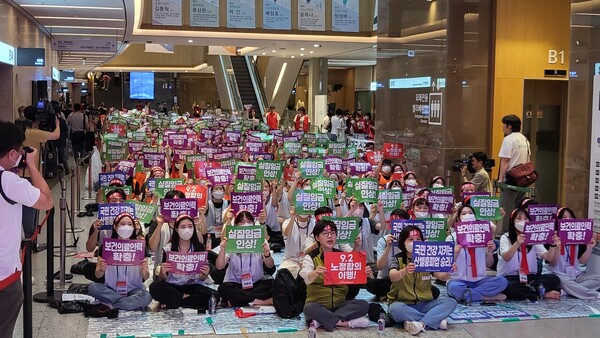The Korean Health and Medical Workers' Union (KHMU), including nurses, caregivers and other healthcare workers, went on a general strike on Thursday for the first time in 19 years, demanding an expanded workforce and better working conditions.
The strike sparked concerns about disrupted medical services, particularly in emergency care.
With the potential participation of general ward nursing staff in the strike for a prolonged period, ensuring adequate patient care in emergency rooms becomes increasingly challenging, despite efforts to maintain essential medical personnel.
The case in point is Pusan National University Yangsan Hospital (PNUYH) where all nurses in the wards are on strike.
The hospital, located in Yangsan, South Gyeongsang Province, has finished transferring all inpatients, except for critically ill patients and those in the emergency room (ER), to nearby tertiary institutions, general hospitals, and convalescent hospitals.
An official at PNUYH said the hospital has finished moving inpatients to other hospitals.
"We have almost finished transferring inpatients -- about 70-80 percent of them,” an official at PNUYH told Korea Biomedical Review.
“Due to the significant participation of nursing staff in the strike, we are facing a significant manpower gap in post-surgical wards. It's a challenging situation because we simply don't have enough personnel to care for the patients adequately.”
The intensive care unit (ICU) was undisrupted because of adequate staffing but the hospital is overwhelmed by patients visiting ER, the official went on to say.
"If the general strike enters a prolonged phase with no idea when it will end, we will not be able to do it with the current manpower. Everyone is so stressed out."
Pusan National University Hospital (PNUH) in Busan also announced on Tuesday that it would discharge inpatients and reduce outpatient services after failing to reach an agreement with the union. The hospital is handing over both inpatients and outpatients to neighboring medical institutions.
Jeonbuk National University Hospital (JBNUH) in Jeonju, North Jeolla Province, is implementing an emergency care system. While the ER and the ICU will continue to operate normally, tests, surgeries, and ward operations will be reduced and consolidated.
Which hospitals are participating?
About 45,000-65,000 healthcare workers working at 145 medical institutions across the nation are participating in the general strike.
The 145 institutions include 29 private-run university hospitals, 12 state-run university hospitals, 12 special-purpose public hospitals, 26 branches of the Korean Red Cross, and 26 provincial hospitals.
Healthcare workers at the nation’s five largest tertiary hospitals -- Samsung Medical Center, Asan Medical Center, Seoul National University Hospital, Severance Hospital, and Seoul St. Mary's Hospital -- are not part of the strike.
However, those at around 20 other major tertiary hospitals are joining the strike. They include Kyunghee University Hospital, Korea University Anam Hospital, Korea University Guro Hospital, Ewha Womans University Mokdong Hospital, Hanyang University Medical Center in Seoul, and Ajou University Hospital in Gyeonggi Province.
What is the union's justification for the strike?
The KHMU said that essential public healthcare is on the verge of collapse due to a lack of manpower.
They argued that the lives and health of the people are at stake, and the strike is necessary to protect them.

A day ahead of the nationwide general strike, the KHMU held a "2023 Healthcare Workers' Union General Strike Eve" at Ewha Womans University Hospital on Wednesday, calling on the government to implement the labor agreement reached on Sept. 2, 2021.
On the eve of the rally, over 800 union members participated in the event, holding signs that read, "Expand the healthcare workforce," "Implement the Sept. 2 labor agreement," "Win the general strike to protect national health," and "Raise real wages.”
Na Soon-ja, leader of the KHMU, said in 2021, during the COVID-19 pandemic, the union reached an agreement on public healthcare and staffing expansion through labor negotiations with the full support of the public.
"It has been nearly two years since the agreement, but it has only been partially implemented. This time, we will make sure (the government) fulfills all the agreements."
Na added, "Employers are not hiring the right number of workers to make a profit by reducing labor costs. Therefore, there is always a shortage of labor," she said, adding, "It is time to improve the quality of medical services by establishing appropriate labor standards for all healthcare personnel, not just nurses."
Specifically, since May, the union has been demanding full expansion of integrated nursing care services, expansion of the healthcare workforce, appropriate staffing standards for each job and clarification of the scope of work, increase in the number of doctors, eradication of illegal medical care, expansion of public healthcare, and support for the recovery period of infectious disease hospitals in response to Covid-19.
However, the union has failed to reach an agreement with hospitals.
Related articles
- Minister urges health workers ‘not to join umbrella union’s political strike’
- 83% think it ‘necessary to legislate optimal number of patients per nurse’
- Medical workers express fury and discontent upon passage of nursing law
- No ‘medical crisis’ seen on strike’s 1st day, but ERs face ‘the calm before the storm’
- Doctors angered by appeals court’s sentence on ER physician for misdiagnosis

